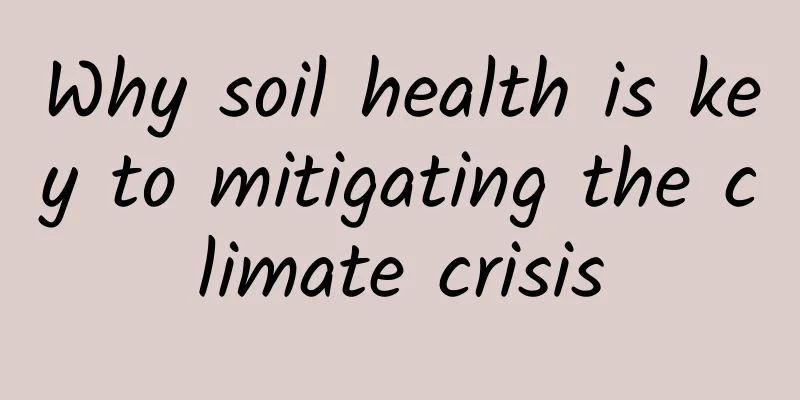Why soil health is key to mitigating the climate crisis

The brown mud that often clings to the soles of people's shoes may seem an unlikely candidate to help us tackle the climate crisis, but scientists are now looking for ways to capture more carbon, and mud and soil are poised to be the main characters in the story. Scientists say we can improve soil quality through simple techniques to help us meet our climate goals. Research data from land management company Downforce Technologies shows that through crop rotation, cover crops and direct seeding techniques, soil can store about 31 billion tons of carbon dioxide each year. Jacqueline McGlade, chief scientist at Downforce, told The Guardian that the impact of doing so is considerable, because in order to achieve the global temperature control target of 1.5°C, our current annual planned emission reduction is still 32 billion tons away from the 2030 emission reduction target, and the amount of carbon dioxide stored using the above method is very close to this gap. Soil is the climate superhero This figure undoubtedly shows the importance of soil. However, a UN report shows that 33% of the world's soil has been degraded. And research shows that soil can store more carbon than the total carbon content in the atmosphere and plants. Soils are an untapped way to store carbon. Image: Visual Capitalist A recent study found that more than half of all species on Earth currently live in soil, the world’s most biodiverse habitat. At the World Economic Forum’s 14th Annual Meeting of the New Champions in Tianjin, China, a panel discussion moderated by Tania Strauss, Head of Food and Water at the World Economic Forum focused on the importance of healthy soils worldwide. Experts say we can restore soils by combining science, technology and nature. "Soil is like the bank account of the planet," said Ole Kristian Sivertsen, CEO of Desert Control, an innovative company that won the World Economic Forum's Uplink Platform Challenge and is committed to using agricultural technology to combat soil degradation. Innovative ways to restore soil Sivertsen believes that we may be able to store more carbon by restoring currently degraded soils, but innovation will be crucial in this process. The Forum’s global 100 Million Farmers initiative is a multi-stakeholder platform that aims to catalyze action on farms to help achieve a net zero emissions food system by 2030. Ms. Yu Xiaohang, Senior Vice President of Yara International and General Manager of China, said at the annual meeting that obtaining technical support and using smart agricultural tools are important parts of the smallholder farm strategy. Also attending the meeting was Professor Fan Shenggen from China Agricultural University, who said better soils have huge potential to mitigate the climate crisis, which is currently untapped. "Without soil, there would be no human beings," Fan Shenggen said. "This is the importance of soil." Author of this article: Emma Charlton, Forum Agenda Writer This article originally appeared on the World Economic Forum's Agenda blog |
<<: Android phones are booming this year
>>: Guangdong bans electric vehicles
Recommend
How to establish a complete user growth system?
The Internet has entered the second half of its e...
A new way to play Douyin information flow ads, one-click direct access to the landing page!
From immersive viewing scenarios to capture users...
Draw custom charts in watchOS
Source code introduction: watchOS does not have a...
Is 9H really scratch-proof? Should I put a protective film on my phone?
According to the material of the film, it can be ...
Is the effect of bidding promotion declining? You must analyze these 8 factors!
Nowadays, most of our SEM promotions revolve arou...
How to do graduation season marketing? Analysis of 3 major marketing strategies!
July is coming, and many people must be having a ...
[Farming in the 24 Solar Terms] Qingming: A good time to plant beans with drizzles
During the Qingming Festival, the weather is clea...
What is the relationship between Chang'e, Houyi and Wu Gang?
This article was first published by Hunzhi (WeCha...
How does your product explode in the market?
There is a saying circulating on the Internet : &...
Winter health guide for diabetics
As the weather turns cold, the cold winter is com...
What will happen to the natural world when humans disappear?
Leviathan Press: Rather than going against our in...
There are some rules for eating salt! Is iodized salt suitable for you?
This is the 4798th article of Da Yi Xiao Hu Iodin...
Super practical! A comprehensive guide to the APP design process from a master's personal notes
Today's translation is full of useful informa...
There are no bones in the elephant's trunk, so how can it perform various complex movements?
Tuchong Creative Elephants are very special anima...
Yinchuan SEO Training: How to increase the speed of website index update?
Building a website and adding new pages can bring...









